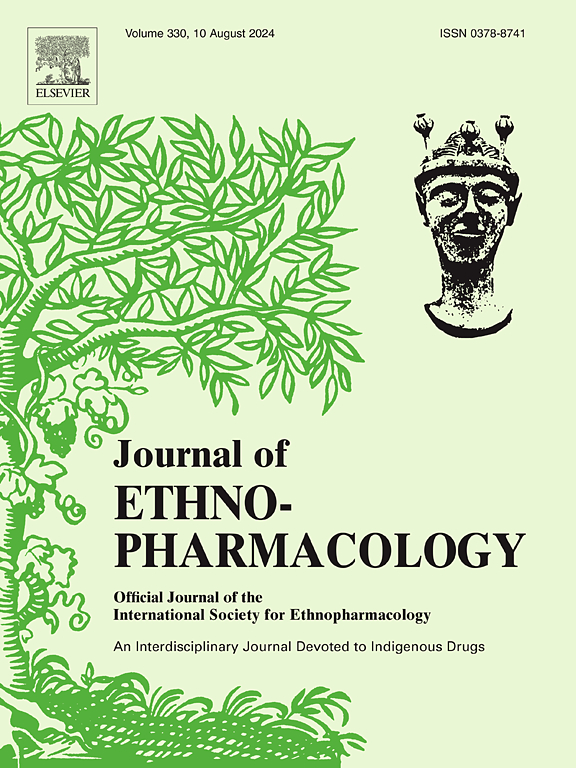凯门鳄油脂对高血压和血脂异常大鼠心脏代谢保护作用的民族药理学研究。
IF 4.8
2区 医学
Q1 CHEMISTRY, MEDICINAL
引用次数: 0
摘要
民族药物学相关性:来自凯门鳄属不同物种的脂肪在巴西传统上用于预防和治疗心血管并发症。尽管其广泛使用,但关于这些制剂的功效和作用机制的数据仍然很少。研究目的:评价凯门鳄内脏脂肪油(YO)治疗与多种危险因素相关的自发性高血压大鼠(SHRs)的潜在心血管保护作用。材料和方法:致动脉粥样硬化饮食8周,诱导心血管和代谢功能障碍。YO(19、56和168 mg/kg)、瑞舒伐他汀(5 mg/kg)和鱼油(56 mg/kg)治疗在4周后开始并持续4周。监测肾功能、血压和心脏活动。评估血脂、炎症和氧化应激标志物以及肝肾功能参数。评估肠系膜血管床的血管反应性,并收集肾脏、心脏和动脉的组织样本进行组织病理学分析。结果:168 mg/kg的YO治疗可显著降低血脂、尿素、肌酐和氧化LDL水平,同时防止动脉内皮功能障碍和内膜-中膜增厚。结论:YO内脏脂肪油治疗具有降脂、降低LDL氧化、预防内皮功能障碍的作用,并可部分调节合并多种危险因素的SHRs的肾功能。进一步的临床前体内研究是必要的,以充分阐明使用YO的益处和风险,特别是在心血管疾病的背景下。本文章由计算机程序翻译,如有差异,请以英文原文为准。

Ethnopharmacological investigations on the cardiometabolic protective effects of Caiman yacare fat oil in hypertensive and dyslipidemic rats
Ethnopharmacological relevance
The fat derived from different species of the genus Caiman is traditionally used in Brazil for the prevention and treatment of cardiovascular complications. Despite its widespread use, data on the efficacy and mechanisms of action of these preparations remain scarce.
Aim of the study
To evaluate the potential cardiovascular protective effects of treatment with Caiman yacare visceral fat oil (YO) in spontaneously hypertensive rats (SHRs) associated with multiple risk factors.
Materials and methods
SHRs received an atherogenic diet for 8 weeks to induce cardiovascular and metabolic dysfunction. Treatments with YO (19, 56, and 168 mg/kg), rosuvastatin (5 mg/kg), and fish oil (56 mg/kg) started after 4 weeks and continued for 4 weeks. Renal function, blood pressure, and cardiac activity were monitored. Serum lipids, inflammatory and oxidative stress markers, as well as liver and kidney function parameters, were assessed. Vascular reactivity of mesenteric vascular beds was evaluated, and tissue samples from the kidneys, heart, and arteries were collected for histopathological analyses.
Results
Treatment with YO at 168 mg/kg significantly reduced serum lipids, urea, creatinine, and oxidized LDL levels while preventing arterial endothelial dysfunction and intima-media thickening.
Conclusion
The treatment with YO visceral fat oil exerts lipid-lowering effects, reduces LDL oxidation, and prevents endothelial dysfunction, while also partially modulating renal function in SHRs with multiple risk factors. Further preclinical in vivo studies are necessary to fully elucidate the benefits and risks associated with the use of YO, particularly in the context of cardiovascular diseases.
求助全文
通过发布文献求助,成功后即可免费获取论文全文。
去求助
来源期刊

Journal of ethnopharmacology
医学-全科医学与补充医学
CiteScore
10.30
自引率
5.60%
发文量
967
审稿时长
77 days
期刊介绍:
The Journal of Ethnopharmacology is dedicated to the exchange of information and understandings about people''s use of plants, fungi, animals, microorganisms and minerals and their biological and pharmacological effects based on the principles established through international conventions. Early people confronted with illness and disease, discovered a wealth of useful therapeutic agents in the plant and animal kingdoms. The empirical knowledge of these medicinal substances and their toxic potential was passed on by oral tradition and sometimes recorded in herbals and other texts on materia medica. Many valuable drugs of today (e.g., atropine, ephedrine, tubocurarine, digoxin, reserpine) came into use through the study of indigenous remedies. Chemists continue to use plant-derived drugs (e.g., morphine, taxol, physostigmine, quinidine, emetine) as prototypes in their attempts to develop more effective and less toxic medicinals.
 求助内容:
求助内容: 应助结果提醒方式:
应助结果提醒方式:


